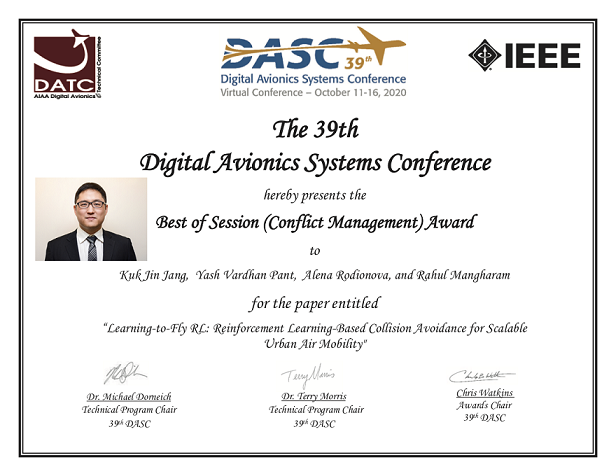


Nikolai Matni has been awarded a prestigious Google Research Scholar Award for his research on Roust Learning for Safe Control. The Research Scholar Program 2021 supports early-career professors who are pursuing world-class technical research in Computer Science, Engineering and related fields around the world. For 2021 Google have granted 77 awards, which included 86 principal investigators representing 15+ countries and over 50 universities. All proposals go through a stringent review process involving expert reviewers to assess them for merit, innovation and alignment with Google’s overall research policy.
Congratulations to Nikolai Matni on this well-deserved recognition by Google.
Quoted in the New York Times, Prof. Gottschlich was discussing how AI is becoming increasingly prevalent and personalized.

Congratulations to George Pappas on receiving the Distinguished Alumni Award BEARS 2021 from Berkeley. He was recognized for “influential contributions to the field of control theory and in particular, hybrid systems, embedded systems, hierarchical and distributed control systems, and for leadership in setting strategic directions for ECE departments in the USA and abroad.”

Nikolai Matni is the recipient of the Faculty Early Career Development (CAREER) Award from the National Science Foundation (NSF) for his winning proposal entitled "Toward a theory of robust learning and control for safety critical autonomous systems."
This NSF CAREER program offers support to junior faculty who exemplify the role of teacher-scholars through outstanding research, excellent education and the integration of education and research.
Congratulations to Nikolai!

Congratulations to Filip Niksic (who just finished postdoc here and joined Google). His PhD thesis, at MPI-SWS advised by Rupak Majumdar, on "Combinatorial Constructions for Effective Testing" won the John C. Reynolds Doctoral Dissertation Award - This is an annual award given by ACM SIGPLAN for a doctoral dissertation in the field of programming languages.
Citation:
Soundness is at the core of most programming language verification techniques. On the other hand, random testing is one of the most commonly used techniques for analyzing software. Developing a theory of soundness for random testing is therefore a very important goal, but very few results existed before this thesis. Randomized techniques are seldom used in (sound) program analyses, which means that addressing the problem required the development of new ways to approaching it. Filip Niksic's thesis is among the first to apply deep techniques from randomized algorithms and combinatorics to the problem of understanding and explaining the effectiveness of random testing. Moreover, the theory helps with the design of new random testing approaches. The thesis addresses a hard problem, brining in novel theory from outside programming languages, and proving hard theorems. As scientists, when we see a phenomenon that we cannot immediately explain (in this case, the effectiveness of random testing), we should try to build a scientific explanation. For some problems, including random testing, it is unclear that one can actually formulate a precise theory, because the "real world" is extremely messy. The fact that Filip Niksic is able to formulate such problems precisely and prove nontrivial theorems about them is surprising and opens the door to a new field.


Congratulations! Our center director and his team have been awarded the prestigious grant, from the Department of Defense, for their “Robust Concept Learning and Lifelong Adaptation Against Adversarial Attack” proposal. This multidisciplinary university research initiative project, supported by the Army Research Office, aims to uncover the science that would make building AI systems that are resilient to adversarial attacks and can grow in functionality over time (by learning from experience). They hope that their proposed adaptive learning vision will likely become a cornerstone toward the ubiquitous adoption of future machine learning systems.



Our work on Designing Safe Autonomous Systems includes autonomous air traffic control for future drone urban air mobility networks of 1000-5000 drones over urban areas. One key issue is that - unlike commercial airlines, these drones do not fly along pre-set routes but follow what is called "free flight" and can choose their travel route. This introduces a critical problem of collisions between drones and needs to be handled via collision avoidance systems between the drones. We believe that this is a notoriously difficult problem among the many hot topics for research.
Kuk Jang, Yash Pant, Alena Rodionova and Prof. Rahul Mangharam wrote a paper on Learning-to-Fly RL which won the Best in Session Award at the Digital Avionics Systems Conference last week. To learn more, please check out their talk video.
Congratulations to Rahul and all!

Justin Gottschlich shared his insights on the current and future directions for machine and neural programming with Next Platform TV (16 Oct 2020 episode). Check out his commentary begins at the 27:15 minute mark.

Nikolai Matni was featured in Issue 5 (Vol. 40, Oct. 2020) of Control Systems Magazine's "People in Control." Check out here to find out how he got started working in controls, his passion of the the field, and his insights of such exciting research opportunities/directions!


Insup Lee and his team partner with Hillrom and Penn Nursing to optimize the use of medical devices in clinical settings to improve patient outcomes. To learn more, please go to Penn Today and the Daily Pennsylvanian.